Russian children near the sump. Part of 1
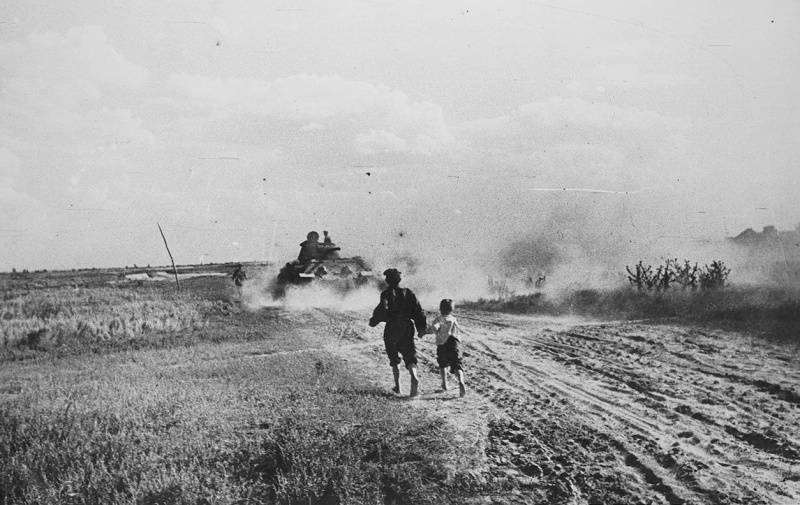
On the eve of Children's Day, which will be celebrated throughout Russia 1 June, I want to recall the children's concentration camps and the occupation.
According to Rossiyskaya Gazeta (vol. From 27.02.2012), metropolitan parliamentarians at their meeting almost unanimously voted for an amendment to the federal law “On Veterans”. As a result, the bill was adopted in the first reading as an idea with the requirement to bring the proposal to a state of workable law.
The legislative initiative of the Moscow City Duma provided for the creation in Russia of a new category of benefit recipients - “children of war”. It concerns those born between 22 June 1928 of the year and 9 of May 1945 of the year, that is, those who at the time of the start of World War II were less than 14 of years. They often worked and fought on a par with adults, but at the present time they have no privileges either as participants in the war or as workers in the rear. Unfortunately, every year children of war, who at the cost of incredible efforts have survived, having overcome the tests of fear, hunger, concentration camp, orphanhood, is becoming less and less. That is why today the memories of these early matured people about the real facts of the cruel war years are especially important for posterity. But so far this law has not been passed.
Vladimir Naumov - a witness. He lives in the city of Morozovsk, Rostov Region, and was able to recall many facts of the inhuman attitude of the German invaders.
* * *
I was born in April 1934 in a large family, where, besides me, my elder sister Lydia and two younger brothers, Yuri and Nikolai, were brought up. Here, in Morozovsk, I lived with my parents right up to the beginning of the Great Patriotic War. 22 June 1941, the father, Ivan Vladimirovich, came home from work (he worked as a driver in the district party committee, drove the first secretary on a M-1 passenger car) and emotionally discussed the message about the attack of fascist troops on our country with neighbors. They said that the Germans would not reach here, the Red Army would not allow enemies to our city, and in a month or two the war would end. 1 September 1941, I went to the first grade of elementary school, which was located at the train station.
There was no fear of the approaching enemy. However, my mother told me:
- Son, you will not go to school anymore. The Germans will start bombing the station, they will bomb the school and you.
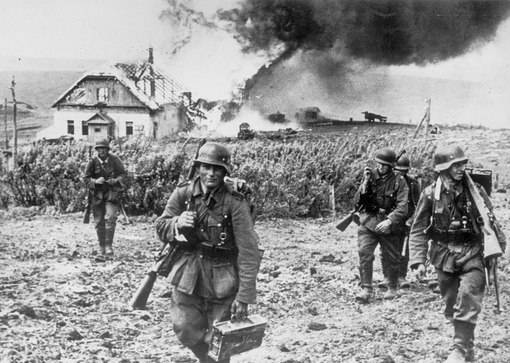
My study was interrupted until January 1943. Fear and depression appeared. In the first year of the war, the Central Committee immediately issued a decision to create underground city committees, district committees and partisan detachments in the occupied territories. An attempt was made to comply with this resolution and the Morozov district committee. Somewhere far from the city, in beams, dug-out dugouts, brought everything necessary for armed resistance and prepared to act. Of course, dad was all the time there, at home did not appear. But when the first snow fell, German reconnaissance aircraft discovered the location of this detachment, started bombing and shooting it. The decision was made to disband the detachment, and the pope was mobilized into the army.
I remember those mournful moments well when, at the station, our whole family accompanied him to the Stalingrad front. Mom cried, holding in her arms one-year-old brother Yura. I also cried, clinging to my mother. A fifteen-year-old sister Lida stood with a detached look. Then we watched for a long time after the departing train. It should be recalled that in the winter of 1941, Hitler was defeated near Moscow. And in 1942, he changed his plans, deciding to seize the Baku oil field and reach the shores of the Volga. All forces were thrown into this direction. In June, 1942, on our street, the movement of various vehicles intensified, primarily with refugees and retreating troops. At the school, which to this day is located next to the parental home, there is a control point. Militiamen and military stopped civilian cars and buses moving down the street. These cars were loaded with men, women and children with all sorts of household things. Basically, officials of different caliber and Jewish population fled from the Germans. They were landed from cars, motor transport requisitioned in favor of the army. Many brands of cars and in general everything that happened aroused my great curiosity. In one of the bright sunny days of July, two German planes appeared above our street. Firing from his weapons, they flew so low that the windows in the house were loudly shaking. Probably at the same time bombed the elevator and the tank farm. The flames from them were visible from any end of the city and region. And then at the elevator for a long time the grain smoldered and smoked.
Mom, together with us children, decided to flee from the fascists advancing on the city. We were leaving on a collective farm cart drawn by bulls, to some distant relatives or acquaintances in a Siberian farm. But we were forced to return to the city. A little later, from the conversations of adults, it became clear that the Germans were already in Morozovsk. And soon I saw the Germans personally.
One day, standing in the courtyard, my mother saw several German cars approaching the farm. Frightened, she shouted to me:
- Volodya, hide under the bed!
I fulfilled my mother's request, but soon I got out from under the bed and began to look out the window. I really wanted to see what these fascists actually were, perceived by adults with fear and hatred. In the bodies of three or four cars in several rows sat German soldiers with machine guns, not rifles, like ours. Arriving at the farm, they jumped off the cars, split into “troika” and went into the yards to catch the men.
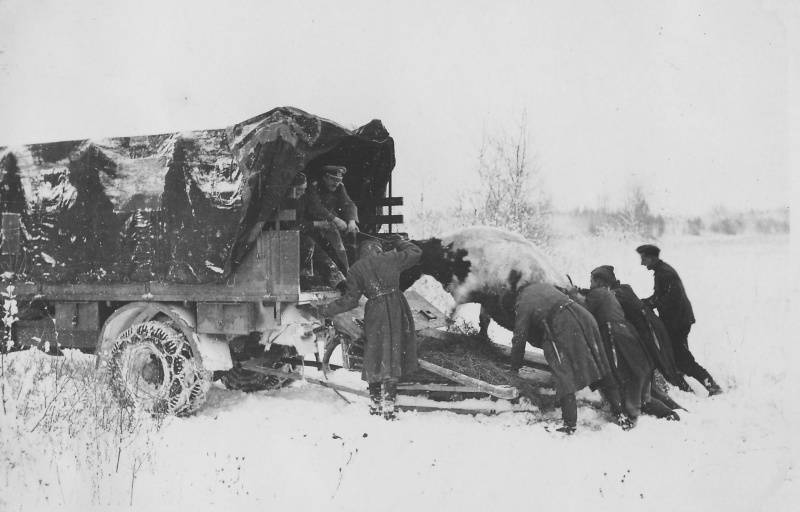
Came to us. They looked into all the buildings, under the beds, into the cellar, after which, taking with them a jar of sour cream and eggs, calmly retired.
My mother and I were home by then, where our 90-year-old grandmother was also. The stone-paved Krasnoarmeyskaya Street (now Voroshilov), where our house was located, was considered central, and the fascists marched through Stalingrad along it. Moreover, in two columns: high-speed equipment was moving along the pavement, and next to it were tractors with large cannons and horse-drawn carts on automobile wheels, field kitchens, many of which were smoking. The whole procession rumbled from morning until late evening.
I watched her through the fence of our yard. The columns moved and moved continuously eastwards for two to three weeks. It was impossible to cross to the other side of the road. And I so wanted to go to my beloved aunt.
On the same days, by order of the German command, an airfield was equipped not far from the city. Not once did I observe the landing and take-off of numerous Wehrmacht aircraft from it.
My mother and Germans were kicked out of the house. They arranged a place for the rest of some high-ranking officer. There, on a table covered with a white tablecloth, plates, forks, glasses, bottles were placed, next to it there was a clean bed. There was a stock of canned, liquor. Here lived a German adjutant.
Our life moved to a small kitchen in the yard. Interestingly, this officer did not appear in the courtyard. Apparently, difficult cases at the front did not allow for a respite.
On August 23, intense bombing of Stalingrad and battles for mastering it began. The battle for Stalingrad for the Nazis became a "tough nut", their losses increased, the number of wounded increased. Before that, the Germans scattered leaflets throughout the city, in which they warned the population that flights would begin that day and that, perhaps, aviation The Red Army will bomb their airfield, so aerial combat is not ruled out. As citizens were informed, Stalingrad will be taken.
In the neighboring yard there lived one of the city officials, who was evacuated somewhere during the occupation. In this yard, an air-raid shelter was dug back in 1941. Its depth was a little more than our cellar in the kitchen. In the bomb shelter, we with the whole family and the neighbors ran to hide, when an air-raid was announced as the buzz of several locomotives. Sometimes they sat for a long time. By the end of the seat it was even difficult to breathe.
And at the hands of my mother was a two-year-old brother Yura, who constantly wanted something and did not like it in this dungeon. Occasionally a German adjutant would drop by at our shelter and with gestures he explained that airplanes were still flying. However, he always exclaimed:
- Stalingrad Kaput! Stalingrad kaput!
But, probably, kaput came at Stalingrad for him.
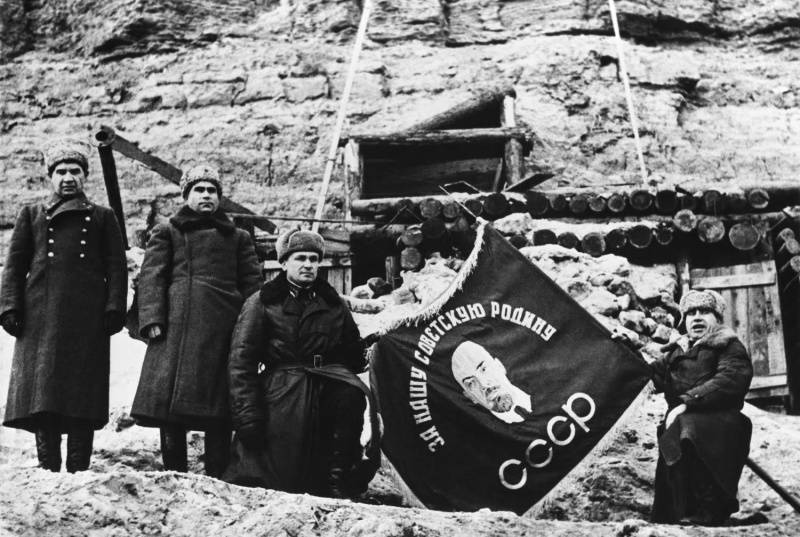
At the school next door to our house was a hospital. We were even driven out of the kitchen. It staged a grocery warehouse. We began to live close to home, at my aunt, father's sister. In our house there were huge boilers in which they cooked food for the German wounded.
A pit was dug in the garden where food wastes were dumped: cleaning vegetables, food debris, and bones from cooked meat. The cesspool was for us truly grace. I remember how my mother or 16-year-old sister made forays to this pit. They collected everything that could somehow be used as food. The cleaning was thoroughly washed and then boiled. Sometimes there were whole frozen beets, carrots or potatoes. It was a double joy. They were even more happy when the bones were boiled. They were nibbled with unimaginable greed. Once I even broke my front tooth. The time was insanely hungry. Especially with the onset of winter. The fascists took away all the preparations and all domestic animals.
The locals ate mostly burnt grain brought by teenagers, cousins Lena and sister Zina from a burnt down elevator. Adults managed to scroll through the grain through an improvised meat grinder and cooked porridge, and sometimes they managed to make pancakes, which were then roasted on solid oil. They were black as soot, but we ate them to satisfy a burning hunger. I still remember the taste of those pancakes made from half-burned wheat.
Mom was very often driven out to work at a railway station with a shovel and a broom. She cleaned the feces from the paths after the passage of military echelons in the direction of Stalingrad, as well as echelons, going in the direction of Germany with exported labor. From this exhausting and servile work, mother always returned with curses to the fascists and the war.
16-year-old sister Lida she almost never let go. She was afraid that the Nazis would abuse her. And if the sister went somewhere alone, then Mom would surely take soot from the stove and cover her face.
One day, after returning home from work, my mother said that there, in the station building, for people taken to Germany, they give sweet tea on saccharin and offered to go there to me:
- Volodya, take a can and go ask, maybe you, little one, will be given.
I went to the station, got in line. A few minutes later the fascist approached, took me by the ear and with the exclamation “Vek, Vek!” Pulled out of the line. So it was not possible to “feast on” this burgher.
A similar incident happened to me in the summer, when the Germans had just entered the city. In the military town they broke a food warehouse, where there were large barrels of vegetable oil. The people used it, took the oil.
Somehow they sent me there. When I went there, I met a German sentry. I gestured to him at the barrel of oil, they say, give. And he said:
- Boy, come on the trigger, yayka.
I spread my hands, they say, no.
The invader abruptly waved his foot in my direction, which meant - go, otherwise you will receive.
I remember another terrible case of a man hanging on a tree near our house, on Sovetskaya Street. Somehow a wrong shell or a bomb hit a moving German car. The car was torn to shreds, and in it were postal parcels for the soldiers. They scattered on the street. A man passed by and picked up one parcel post. This fascist noticed, grabbed him, and soon the man was hanged. On his chest was attached a large tag with the inscription "Post Thief".
In late December, four Germans came to my aunt’s house where we lived. They forced the owners to heat the furnace well. Five children and two mothers were moved into one room. Themselves settled in another. In a well-heated room, they took off all their clothes, down to underwear, and, to my surprise and misunderstanding, threw it into the yard in the snow. It turned out that they were thus destroying their lice in the cold.
Then the invaders dined with schnapps and began to sing songs under the harmonica. At midnight, when I was fast asleep, one of these "aliens" came into our bedroom. A dazzling rocket crackled in his hands. The fascist held her for the dome of the parachute and sang something. I certainly woke up. Coming very close to me, he began waving this burning rocket. I was greatly frightened; I was not in the mood to admire the brightly glowing flame. Alarmed for me and mom. Quickly jumping, she stood between me and the fascist.
The “aliens” buzzed in the next room for a long time, so it was difficult to fall asleep. Probably, this small group of warriors, already defeated at Stalingrad, celebrated their Christmas in the war. We gave them a "light".
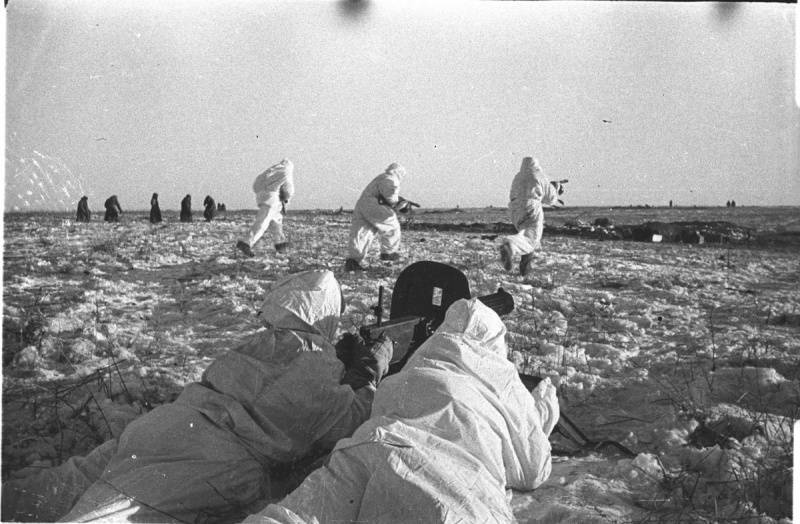
In December, all the Nazi aircraft flew from the airfield. On our street, along which a huge mass of Nazi troops was moving eastward in the summer, now for the whole day one could see one or two cars rushing at great speed. In the back of these cars were soldiers, wrapped from head to toe with anything. Perhaps it was those Germans who did not get surrounded at Stalingrad. And then moved the columns of prisoners of war.
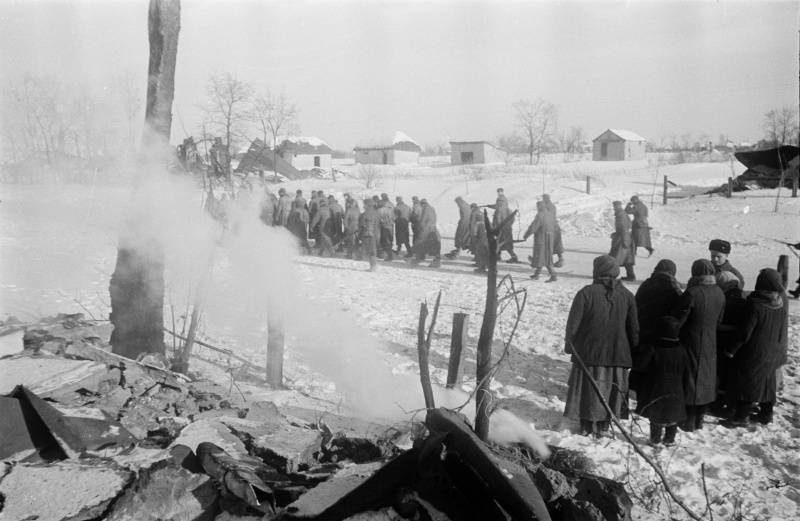
To be continued ...
Information